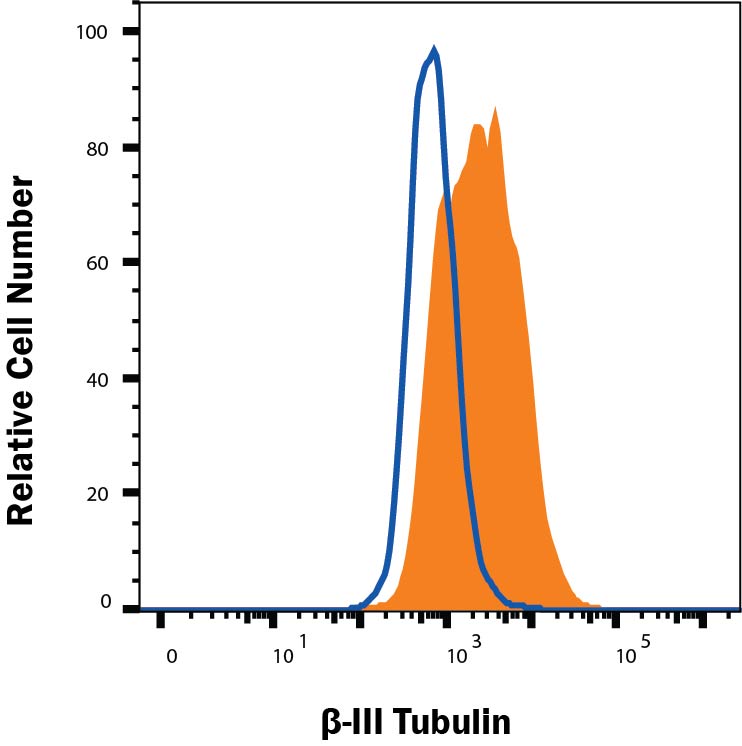Neuron-specific beta -III Tubulin Alexa Fluor® 488-conjugated Antibody
Neuron-specific beta -III Tubulin Alexa Fluor® 488-conjugated Antibody Summary
Applications
Please Note: Optimal dilutions should be determined by each laboratory for each application. General Protocols are available in the Technical Information section on our website.
Scientific Data
 View Larger
View Larger
Detection of beta ‑III Tubulin in HepG2 cells by Flow Cytometry. HepG2 cells were stained with Mouse Anti-Neuron-specific beta ‑III Tubulin Alexa Fluor® 488‑conjugated Monoclonal Antibody (Catalog # IC1195G, filled histogram) or isotype control antibody (Catalog # IC003G, open histogram). To facilitate intracellular staining, cells were fixed and permeabilized with FlowX FoxP3 Fixation & Permeabilization Buffer Kit (Catalog # FC012). View our protocol for Staining Intracellular Molecules.
Reconstitution Calculator
Preparation and Storage
- 12 months from date of receipt, 2 to 8 °C as supplied.
Background: beta-III Tubulin
Tubulin is the major component of microtubules, essential cell cytoskeleton proteins involved in mitosis, cytokinesis and transport of vesicles and organelles. Tubulin is a dimer composed of one alpha and one beta tubulin molecule, which assemble as microtubules in a GTP-dependent manner. The beta-Tubulin molecule exerts GTPase activity to hydrolyze to GDP, effectively governing microtubule formation. Tubulin bound to GTP is prone to form microtubules whereas GDP-bound tubulin molecules in microtubules readily disassemble.
There are several isoforms of beta tubulin which are expressed in a tissue-specific manner. Beta II and beta IV Tubulin are ubiquitously expressed. Beta-III Tubulin, also known as tubulin beta-4, is regarded as a neuron-specific marker. The expression of beta-III Tubulin has been suggested to be one of the earliest markers to signal neuronal commitment in primitive neuroepithelium. One known exception to the neuron-specific nature of beta-III Tubulin expression occurs during cancer formation. Increased expression of beta-III Tubulin in certain cancer cells has lead to the development of anti-tubulin drugs as a novel chemotherapy strategy.
R&D Systems offers beta-III Tubulin antibodies produced from the mouse hybridoma clone TuJ-1 that was elicited from a mouse immunized with rat brain-derived microtubules. These antibodies react with mammalian and chicken neuron-specific beta-III Tubulin but not with other beta tubulin isotypes in glial cells. These antibodies label neuronal cell bodies, dendrites, axons, and axonal terminations and are commonly used for the identification of newly committed neurons. In addition, beta-III Tubulin antibodies serve an excellent loading control when normalizing data specifically for neuronal expression. This may be particularly relevant for biochemical studies of protein expression in Alzheimers disease brain tissue, which may have an increased glial content compared to non-diseased controls.
In addition, we also offer beta-III Tubulin (TuJ-1) antibodies that are directly conjugated to our NorthernLights™ secondary antibodies. NorthernLights conjugated antibodies are bright and deliver a high signal to noise ration, making them ideal for fluorescence microscopy.
Product Datasheets
Product Specific Notices
This product is provided under an agreement between Life Technologies Corporation and R&D Systems, Inc, and the manufacture, use, sale or import of this product is subject to one or more US patents and corresponding non-US equivalents, owned by Life Technologies Corporation and its affiliates. The purchase of this product conveys to the buyer the non-transferable right to use the purchased amount of the product and components of the product only in research conducted by the buyer (whether the buyer is an academic or for-profit entity). The sale of this product is expressly conditioned on the buyer not using the product or its components (1) in manufacturing; (2) to provide a service, information, or data to an unaffiliated third party for payment; (3) for therapeutic, diagnostic or prophylactic purposes; (4) to resell, sell, or otherwise transfer this product or its components to any third party, or for any other commercial purpose. Life Technologies Corporation will not assert a claim against the buyer of the infringement of the above patents based on the manufacture, use or sale of a commercial product developed in research by the buyer in which this product or its components was employed, provided that neither this product nor any of its components was used in the manufacture of such product. For information on purchasing a license to this product for purposes other than research, contact Life Technologies Corporation, Cell Analysis Business Unit, Business Development, 29851 Willow Creek Road, Eugene, OR 97402, Tel: (541) 465-8300. Fax: (541) 335-0354.
Citation for Neuron-specific beta -III Tubulin Alexa Fluor® 488-conjugated Antibody
R&D Systems personnel manually curate a database that contains references using R&D Systems products. The data collected includes not only links to publications in PubMed, but also provides information about sample types, species, and experimental conditions.
1 Citation: Showing 1 - 1
-
Glucose oxidation drives trunk neural crest cell development and fate
Authors: Nekooie Marnany, N;Fodil, R;Féréol, S;Dady, A;Depp, M;Relaix, F;Motterlini, R;Foresti, R;Duband, JL;Dufour, S;
Journal of cell science
Species: Avian - Coturnix japonica (Quail)
Sample Types: Whole Cells
Applications: Immunocytochemistry
FAQs
No product specific FAQs exist for this product, however you may
View all Antibody FAQsReviews for Neuron-specific beta -III Tubulin Alexa Fluor® 488-conjugated Antibody
There are currently no reviews for this product. Be the first to review Neuron-specific beta -III Tubulin Alexa Fluor® 488-conjugated Antibody and earn rewards!
Have you used Neuron-specific beta -III Tubulin Alexa Fluor® 488-conjugated Antibody?
Submit a review and receive an Amazon gift card.
$25/€18/£15/$25CAN/¥75 Yuan/¥2500 Yen for a review with an image
$10/€7/£6/$10 CAD/¥70 Yuan/¥1110 Yen for a review without an image

